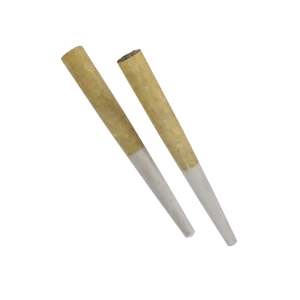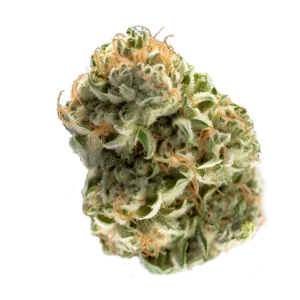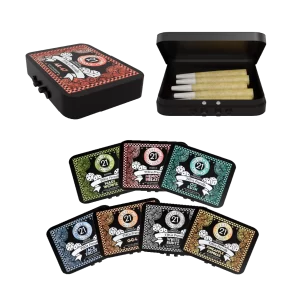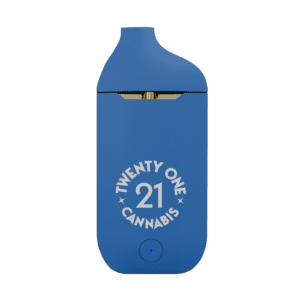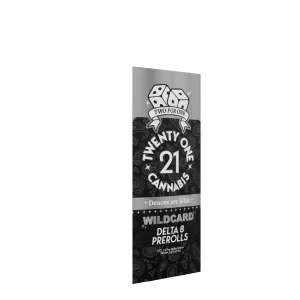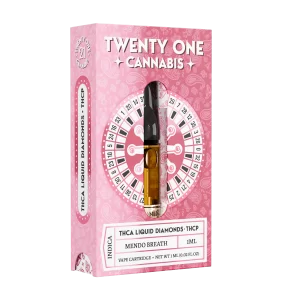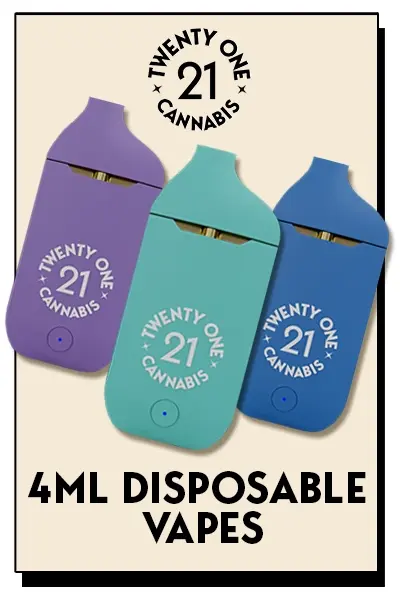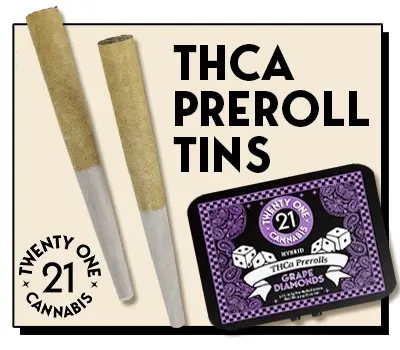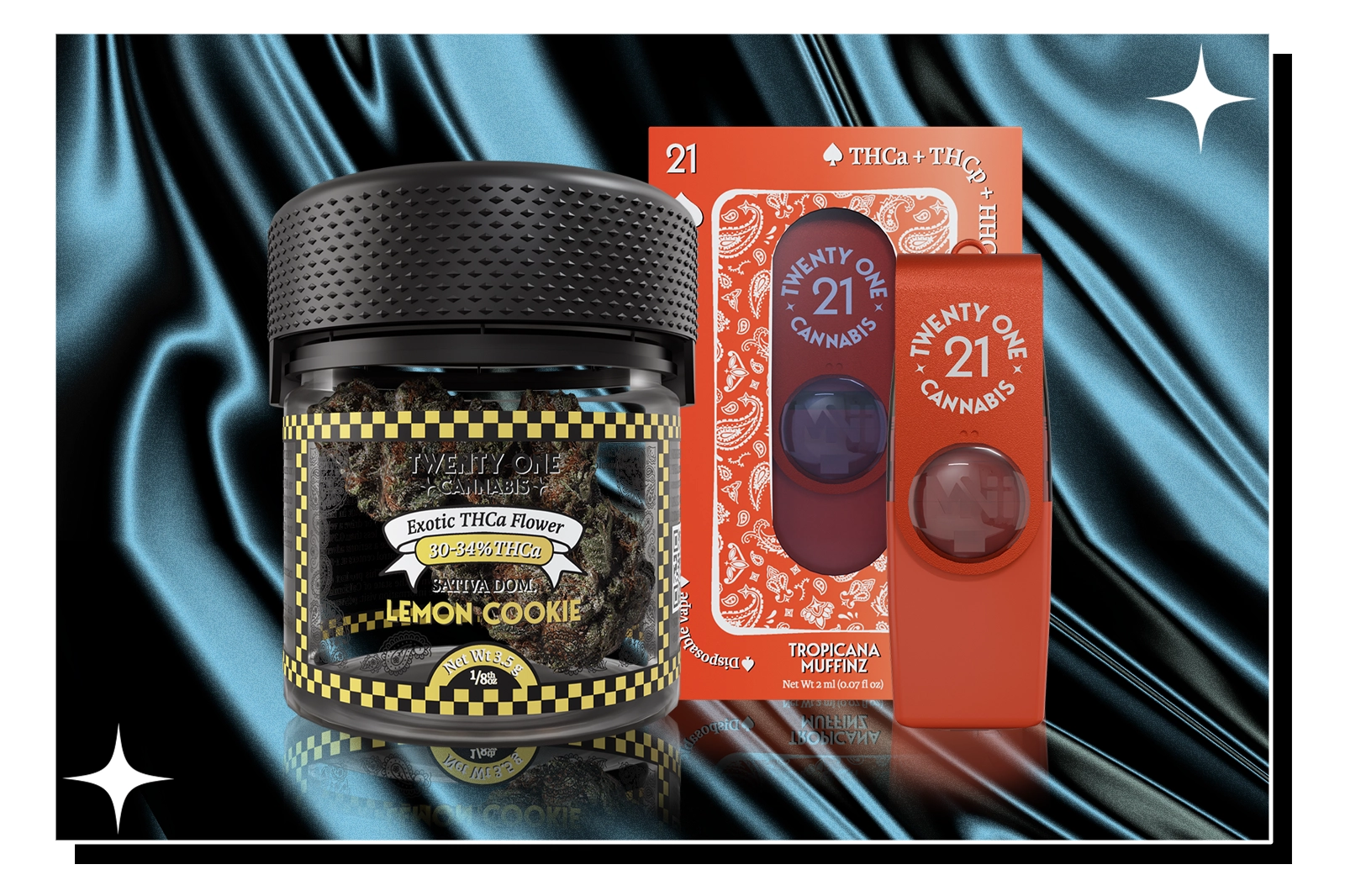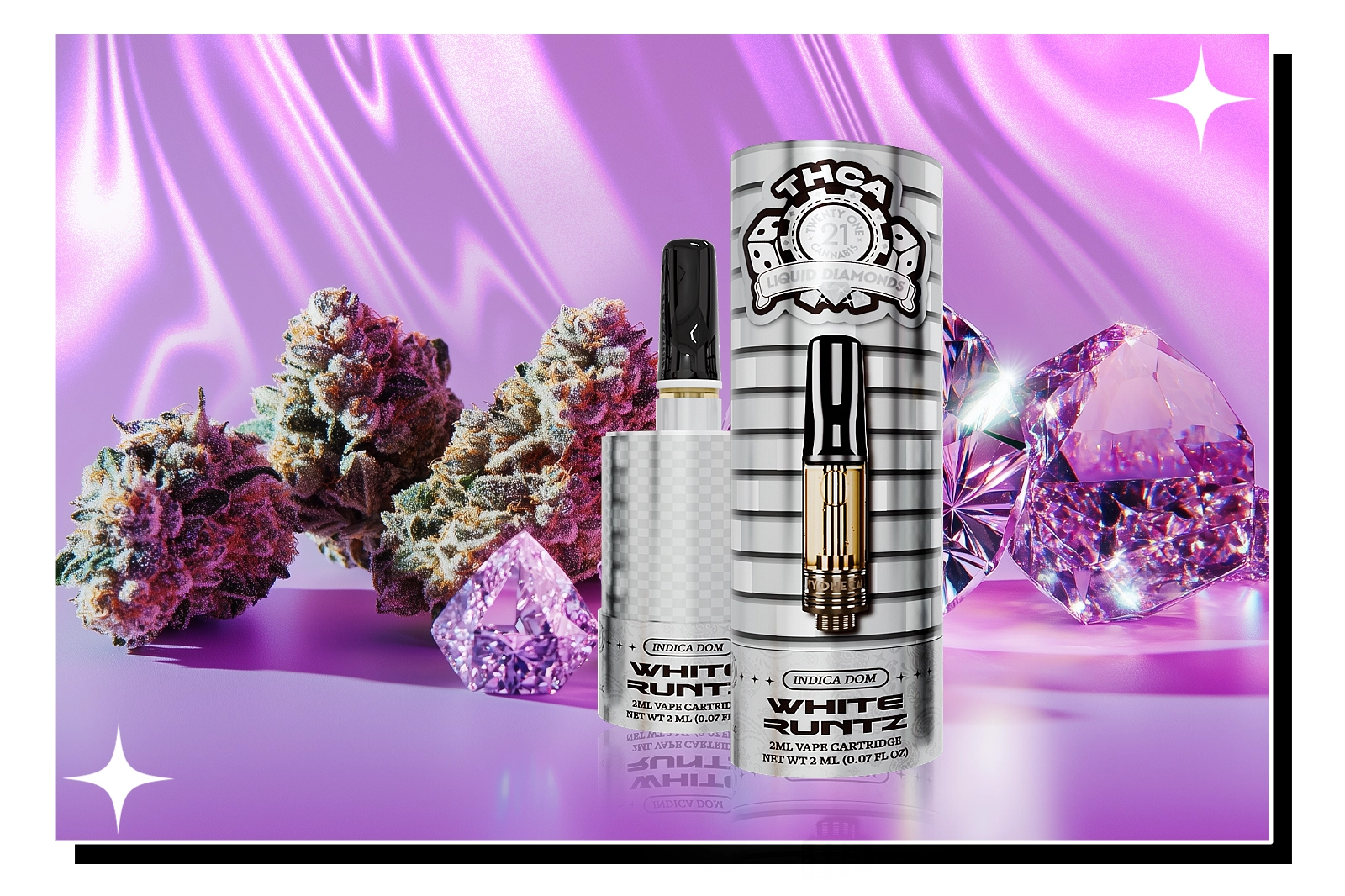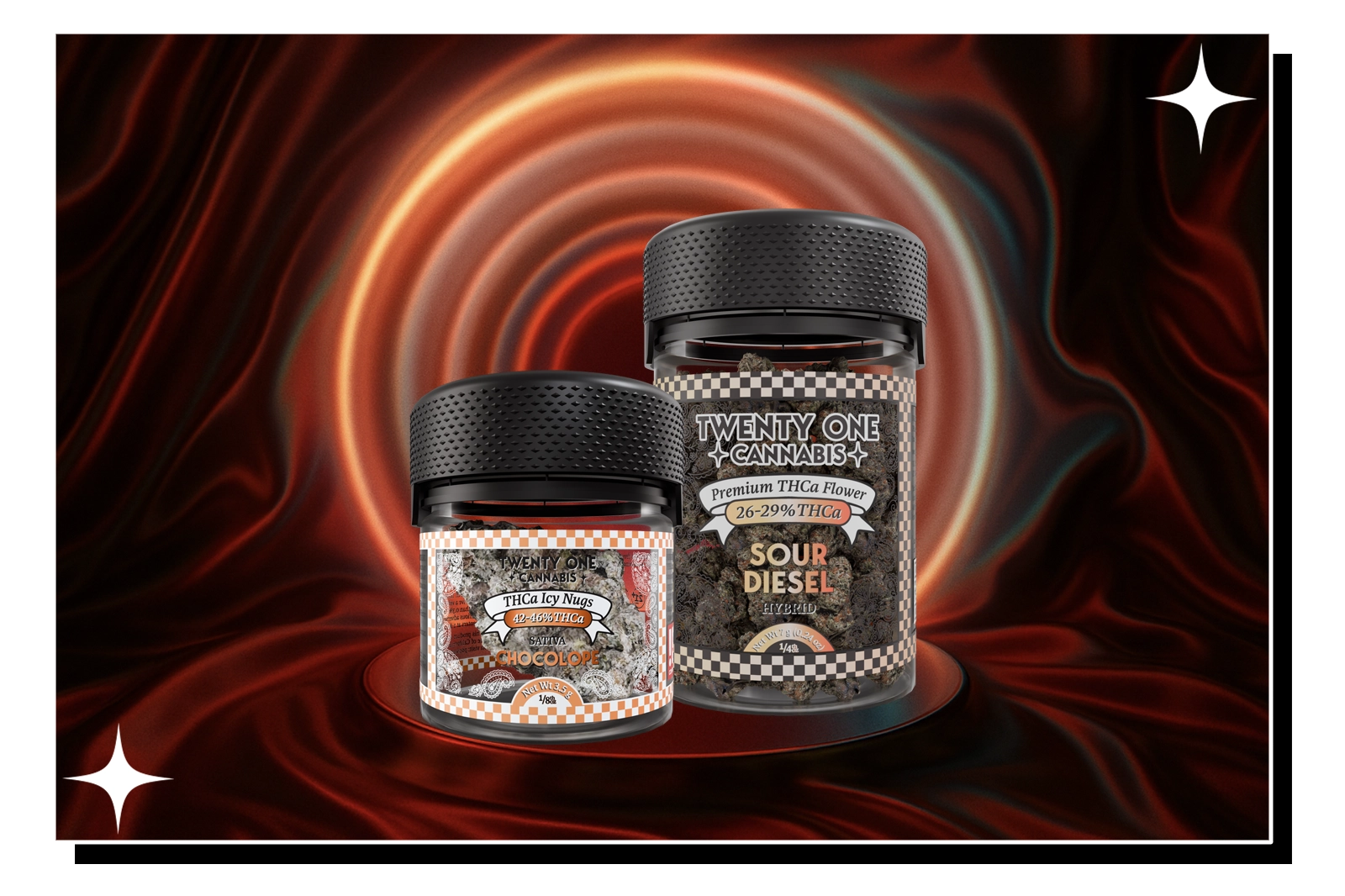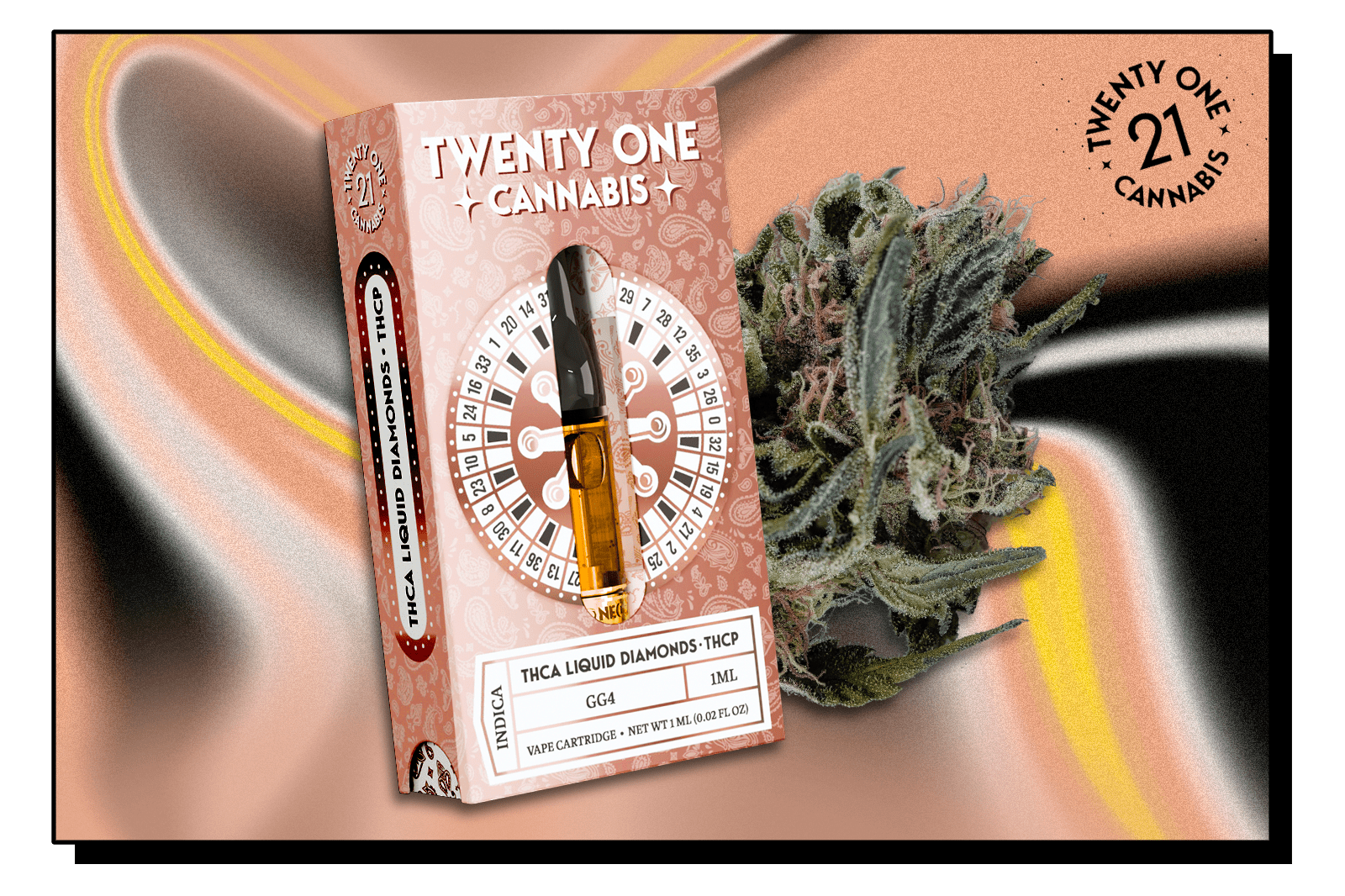
Does THCA Get You High

In this Article
The High Rollers Source for THCa Delta 8 HHC
THCA is a pretty prominent topic in the cannabis industry, but there’s still confusion about what it is and how it affects you.
You may have heard that THCA is non-psychoactive. But, at the same time, you may have heard that it is. So, which is it?
In this article, we’ll look closely at the science behind THCA while exploring how it differs from THC and answer the burning question: does THCA get you high?
Key Takeaways
- THCA is a non-psychoactive cannabinoid in raw cannabis that serves as the precursor to THC, which produces the high associated with marijuana.
- THCA does not cause psychoactive effects because it does not interact with the brain’s CB1 receptors due to its extra carboxyl group.
- THCA converts to THC when heated (through smoking, vaping, or cooking), allowing it to bind to CB1 receptors and produce euphoric effects.
- THCA may offer therapeutic benefits such as anti-inflammatory, neuroprotective, and anti-nausea effects, though these claims are largely anecdotal and need more research.
- THCA can be detected in drug tests, especially urine tests, for varying periods depending on consumption frequency and method.
- Twenty One Cannabis offers a premium collection of THCA prerolls and flowers, providing a superior quality cannabis experience for both relaxation and energy. Shop our line of THCA prerolls and flower.
What is THCA?
THCA, or tetrahydrocannabinolic acid, is a cannabinoid found in raw, unprocessed cannabis plants. It’s the precursor to THC, the well-known compound responsible for the psychoactive effects of marijuana.
When cannabis is harvested and dried, it contains high levels of THCA. This acidic cannabinoid doesn’t produce the “high” associated with cannabis use. That’s because THCA doesn’t interact with the body’s endocannabinoid system in the same way as THC.
For THCA to become psychoactive, it must go through a process called decarboxylation. This occurs when cannabis is heated, such as when you smoke, vape, or cook with it. The heat converts THCA into THC, allowing it to bind to cannabinoid receptors in the brain and produce euphoric effects.
How THCA Differs From THC
The key difference between THCA and THC is their molecular structure. THCA has an extra carboxyl group that prevents it from fitting into the CB1 receptors in the brain, which are responsible for the psychoactive effects.
When exposed to heat, the carboxyl group is removed, and THCA becomes THC. This process, known as decarboxylation, activates the compound’s ability to produce a high.
While THCA doesn’t have psychoactive properties, it’s thought to offer a range of potential therapeutic benefits, such as anti-inflammatory, neuroprotective, and anti-nausea effects.
It’s also important to note that most of the effects and benefits we’ll talk about in this article are purely anecdotal. THCA has not been heavily researched, like major cannabinoids such as THC and CBD. So, while we may claim that THCA might have certain potential benefits, they might not be consistent for everyone.
Does THCA Get You High?
The answer is no. THCA, on its own, does not cause psychoactive effects or produce the “high” typically associated with cannabis use. That’s because THCA’s molecular structure doesn’t allow it to bind effectively to the CB1 receptors in the brain responsible for THC’s mind-altering effects.
For you to experience a high from THCA, it must first be converted to THC through a process called decarboxylation. This occurs when THCA is exposed to heat, such as when you smoke, vape, or cook cannabis.
The Science Behind THCA’s Non-Psychoactive Properties
THCA’s molecular structure includes an extra carboxyl group that prevents it from fitting into the CB1 receptors in the brain. These receptors are key to producing the psychoactive effects of THC.
This means that if you consume raw cannabis or products high in THCA, like raw cannabis juice or THCA crystalline, you won’t experience the high associated with THC.
How THCA Transforms into THC When Heated
Decarboxylation is the process that converts THCA into THC. When you apply heat to THCA, such as by smoking, vaping, or baking cannabis, the extra carboxyl group is removed from the molecule.
This changes the molecular structure of THCA, allowing it to fit into the CB1 receptors in the brain and produce the psychoactive effects associated with THC.
The temperature at which decarboxylation occurs can vary, but it typically begins around 220°F (104°C) and becomes more efficient as the temperature increases. This is why you won’t get high from eating raw cannabis, but you will if you consume cannabis-infused edibles that have been baked or cooked.
Do THCA Gummies Get You High?
THCA gummies, if made with raw, unheated cannabis or THCA extract, will not get you high.
However, if the gummies are made with decarboxylated cannabis or THC extract, they will produce a high. In this case, the THCA has already been converted to THC during the manufacturing process, and consuming the gummies will lead to psychoactive effects.
When purchasing cannabis gummies or other edibles, it’s crucial to check the labeling and understand the difference between THCA and THC content. Some products may advertise high THCA levels but contain little to no THC, while others may have significant levels of THC and produce a potent high.
As with any cannabis product, it’s essential to start with a low dose and wait at least an hour to gauge the effects before consuming more. Edibles can take longer to kick in compared to smoking or vaping, and the high can last much longer.
Benefits of THCA
While THCA won’t get you high, it may offer several potential health benefits. Research suggests that THCA has therapeutic properties, including anti-inflammatory, neuroprotective, antiemetic, and antioxidant effects.
Anti-inflammatory Properties
THCA has shown promise as an anti-inflammatory agent. Inflammation is a natural response to injury or infection, but chronic inflammation can contribute to various health issues. Studies indicate that THCA may help reduce inflammation by interacting with the body’s endocannabinoid system, which plays a role in regulating immune function.
Neuroprotective Effects
THCA may also have neuroprotective properties, meaning it could help protect brain cells from damage. Some research suggests that THCA may be beneficial in preventing several neurodegenerative disorders. However, more studies are needed to fully understand the potential of THCA as a neuroprotective agent.
Antiemetic (Anti-nausea) Potential
THCA has been studied for its potential to reduce nausea and vomiting. This could be particularly helpful for individuals undergoing chemotherapy, as these treatments often cause severe nausea. While more research is needed, THCA may offer a natural alternative to traditional anti-nausea medications.
Antioxidant Activity
Like other cannabinoids, THCA has antioxidant properties. Antioxidants help protect cells from damage caused by free radicals, which are unstable molecules that can contribute to aging and various health problems. By neutralizing free radicals, THCA may help support overall health and well-being.
It’s important to note that while these potential benefits are promising, more research is needed to fully understand the therapeutic potential of THCA. As always, consult with a healthcare professional before using any cannabis products for medicinal purposes.
How to Decarboxylate THCA
If you want to experience the psychoactive effects of THCA, you’ll need to decarboxylate it first. Decarboxylation is the process of converting THCA into THC by applying heat. There are several ways to do this, each with its own advantages and considerations.
Smoking or Vaping Cannabis
Smoking or vaping cannabis is one of the most common and quickest ways to decarboxylate THCA. When you light a joint or heat cannabis in a vaporizer, the high temperature instantly converts THCA to THC, allowing you to feel the effects within minutes.
Keep in mind that the best temperature for THCA diamonds may differ from other cannabis products. Diamonds are a concentrated form of THCA, so they may require higher temperatures to fully decarboxylate.
Cooking With Cannabis
Another popular method of decarboxylating THCA is through cooking. When you infuse cannabis into oils, butter, or other ingredients and apply heat, the THCA slowly converts to THC. This process takes longer than smoking or vaping, but it allows you to create potent edibles that can produce long-lasting effects.
To decarboxylate cannabis for cooking, you’ll typically grind the flower and spread it on a baking sheet. Then, you’ll bake it in the oven at a low temperature (around 220-245°F or 105-120°C) for about 30-45 minutes. This low, slow heat activates the THC without burning off the other beneficial compounds.
Once your cannabis is decarboxylated, you can infuse it into your favorite recipes. Just remember that edibles can take longer to kick in (anywhere from 30 minutes to 2 hours), and the effects can last much longer than smoking or vaping.
If you’re looking for a THCA flower to cook with, this White Runtz THCA flower can be a fantastic option! This indica treat packs a punch with 16% THCA and a sweet vanilla flavor that’s hard not to love!
Using a Decarboxylation Device
For those who want a more precise and efficient way to decarboxylate THCA, there are specialized devices available. These decarboxylators are designed to evenly heat cannabis to the optimal temperature for THCA conversion without the risk of burning or degrading the other compounds.
Using a decarboxylation device is relatively simple. You’ll place your cannabis in the machine, set the temperature and time according to the manufacturer’s instructions, and let it work its magic. Some devices even have built-in settings for different types of cannabis products, taking the guesswork out of the process.
Once your cannabis is decarboxylated, you can use it to make edibles, tinctures, or other THC-infused products. This method is ideal for those who want to create large batches of activated cannabis or ensure a consistent level of potency in their homemade products.
No matter which method you choose, decarboxylating THCA is key to unlocking its psychoactive potential. Whether you prefer the instant gratification of smoking, the long-lasting effects of edibles, or the precision of a decarboxylation device, there’s an option that suits your needs and preferences. Just remember to start low and go slow, especially if you’re new to cannabis or trying a new decarboxylation method.
THCA vs Other Cannabinoids
THCA is just one of many cannabinoids found in the cannabis plant. While it shares some similarities with other compounds, it also has unique properties that set it apart. Let’s compare THCA to some of the most well-known cannabinoids to help you understand how it fits into the bigger picture.
THCA compared to THC
As we’ve discussed, THCA is the precursor to THC. While they have a similar molecular structure, THCA does not produce the psychoactive effects that THC does. THCA must be decarboxylated, or heated to convert into THC and become psychoactive.
THC is known for its euphoric, mind-altering effects, as well as its potential therapeutic benefits, such as pain relief, appetite stimulation, and sleep aid. THCA, on the other hand, is non-intoxicating but may offer its own set of health benefits, including anti-inflammatory and neuroprotective properties.
THCA Compared to CBD
CBD, or cannabidiol, is another popular non-psychoactive cannabinoid. Like THCA, CBD does not produce a notable high, but it has been studied for its potential to relieve anxiety, reduce inflammation, and improve sleep. It’s important to note that CBD’s effects vary greatly based on an individual’s cannabis tolerance.
THCA and CBD interact with the body’s endocannabinoid system differently. CBD works by indirectly influencing the CB1 and CB2 receptors, while THCA does not bind to these receptors at all.
Some studies suggest that THCA may be more effective than CBD at reducing inflammation and providing neuroprotection. However, more research is needed to fully understand the differences between these two compounds.
THCA Compared to CBG
CBG, or cannabigerol, is often referred to as the “mother cannabinoid” because it is the precursor to other compounds like THC and CBD. Like THCA, CBG is non-psychoactive and has been studied for its potential health benefits.
CBG has shown promise as an antibacterial agent, an anti-inflammatory, and a neuroprotectant. It may also help stimulate appetite and promote bone growth. While THCA shares some of these potential benefits, it appears to be more potent in its anti-inflammatory and neuroprotective effects.
One key difference between THCA and CBG is their abundance in the cannabis plant. CBG is typically found in low concentrations, while THCA is much more abundant in raw cannabis. This makes THCA easier to extract and study for its therapeutic potential.
It’s worth noting that the research on THCA is still in its early stages, and more studies are needed to fully understand how it compares to other cannabinoids. However, the unique properties of THCA make it a promising compound for both medicinal and wellness applications.
If you want to fully understand the differences between THCA and other cannabinoids, check out our in-depth comparisons of THCA vs HHC and THCA vs THCP.
How Long Does THCA Stay in Your System?
THCA can linger in your system for varying lengths of time, depending on several factors. It’s important to understand these factors and how they impact drug testing if you’re concerned about the presence of THCA in your body.
Factors Affecting THCA Detection Times
The amount of time THCA remains detectable in your system depends on your individual metabolism, body fat percentage, and the frequency and quantity of cannabis consumed. Those who use cannabis regularly and in high doses may have THCA detectable in their system for a longer period of time compared to infrequent or occasional users.
The method of consumption also plays a role in detection times. Smoking or vaping cannabis can lead to faster elimination of THCA from the body, while ingesting cannabis edibles can result in longer detection windows due to the slower absorption and metabolism of THCA in the digestive system.
Type of Drug Test
Different drug tests have varying detection windows for THCA. Urine tests, the most common method of drug screening, can detect THCA metabolites for several days to several weeks after use, depending on the frequency and quantity of consumption. For occasional users, THCA may be detectable in urine for up to 5 days, while heavy users may test positive for 30 days or longer.
Blood tests have a shorter detection window, typically only detecting THCA for a few hours to a few days after use. This method is less commonly used for drug screening due to its invasive nature and shorter timeframe for detection.
Hair follicle tests have the longest detection window, with THCA detectable for up to 90 days after use. However, these tests are less common and more expensive compared to urine or blood tests.
It’s important to note that while THCA itself may not cause psychoactive effects, it can still be detected in drug tests and may have legal or employment consequences in some situations. If you’re subject to regular drug testing, the chances of you failing the test are practically guaranteed.
THCA Products and Consumption Methods
THCA is available in a variety of products, each with its own unique consumption method and effects. Understanding the differences between these products can help you choose the best option for your needs and preferences.
THCA Flower
THCA flower is the raw, unheated form of cannabis that is rich in THCA. You can consume THCA flower by juicing or blending it into smoothies, which preserves the THCA content and offers potential therapeutic benefits without the high. Alternatively, you can smoke or vape THCA flower to decarboxylate it and experience the psychoactive effects of THC.
If you’re looking for a premium flower packed with tons of THCA, this Chem Dawg THCA flower could be just what you need! Its sativa-dominant features and diesel-like flavors are one of the best TwentyOne Cannabis has to offer!
THCA Prerolls
THCA prerolls are pre-rolled joints made with high-THCA cannabis flowers. These are convenient for those who want to smoke THCA flowers without the hassle of grinding and rolling their own joints. Keep in mind that smoking THCA prerolls will convert the THCA to THC, resulting in psychoactive effects.
Don’t want to go through the hassle of buying traditional THCA flowers? Our lineup of THCA prerolls is here to help you out! If you’re looking for a sweet-tasting indica to help you wind down, these Grandaddy Purple THCA prerolls are an amazing choice.
THCA Tinctures and Oils
THCA tinctures and oils are liquid concentrates that can be consumed sublingually (under the tongue) or added to food and beverages. These products offer a discreet and easy way to consume THCA without smoking or vaping. When purchasing THCA tinctures or oils, pay attention to the concentration of THCA and follow the recommended dosage instructions.
THCA Edibles and Beverages
THCA can also be infused into edibles and beverages, such as gummies, chocolates, and teas. These products offer a tasty and convenient way to consume THCA, but it’s important to note that the THCA in these products has likely been decarboxylated during the cooking or baking process, converting it to THC. As a result, THCA edibles and beverages will produce psychoactive effects, so start with a low dose and wait at least an hour before consuming more.
THCA Topicals
THCA topicals, such as creams, balms, and transdermal patches, are applied directly to the skin. These products are designed to target localized pain or inflammation without producing psychoactive effects. THCA topicals are a good option for those who want to experience the potential therapeutic benefits of THCA without the high.
Final Thoughts – Is THCA Right for You?
Deciding whether THCA is right for you depends on your individual needs and goals. If you’re seeking potential therapeutic benefits without the psychoactive effects of THC, THCA may be worth exploring. Its anti-inflammatory, neuroprotective, and antiemetic properties show promise for various health conditions.
However, it’s important to weigh the potential benefits against the risks. While THCA is generally considered safe, it can still show up on drug tests and may have legal implications in some areas. Additionally, the lack of regulation in the cannabis industry means that some THCA products may be mislabeled or contain contaminants.
Before incorporating THCA into your wellness routine, consult with a healthcare professional, especially if you have any pre-existing medical conditions or are taking medications. They can help you determine if THCA is appropriate for your specific situation and guide you on safe dosage and consumption methods.
With that said, if you feel like THCA is the right choice for you, you can try it out with the premium collection at Twenty One Cannabis. Our premium THCA prerolls and flowers are crafted for superior quality and potency. Perfect for any occasion, our products offer both relaxation and energy.
Shop our extensive selection and find the perfect cannabis experience for you at Twenty One Cannabis.
Sources for this Article
- ncbi.nlm.nih.gov/pmc/articles/PMC5627671/
- ncbi.nlm.nih.gov/pmc/articles/PMC5731255/
- ncbi.nlm.nih.gov/pmc/articles/PMC3792001/
- sciencedirect.com/science/article/pii/S0367326X21000903
- ncbi.nlm.nih.gov/books/NBK425767/
- ncbi.nlm.nih.gov/pmc/articles/PMC9666035/
-
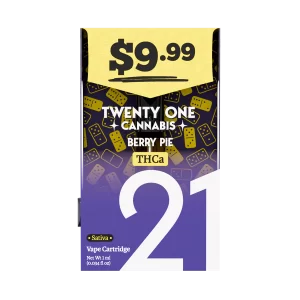
THCa 1ml Vape Cartridge – Berry Pie (Sativa)
$9.99 -
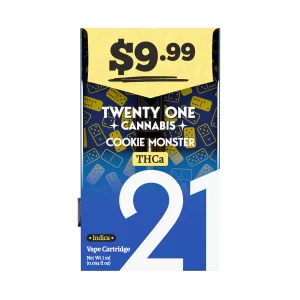
THCa 1ml Vape Cartridge – Cookie Monster (Indica)
$9.99 -
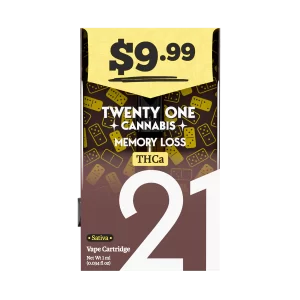
THCa 1ml Vape Cartridge – Memory Loss (Sativa)
$9.99 -
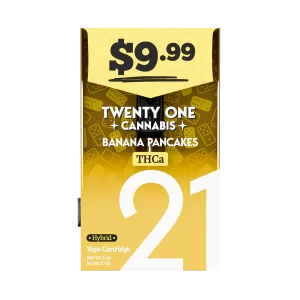
THCa 1ml Vape Cartridge – Banana Pancakes (Hybrid)
$9.99 -
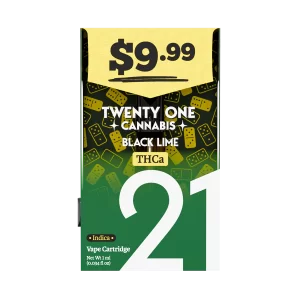
THCa 1ml Vape Cartridge – Black Lime (Indica)
$9.99 -
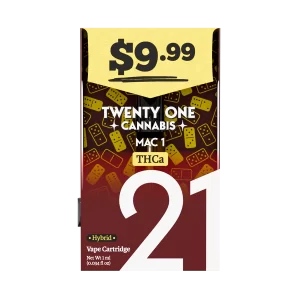
THCa 1ml Vape Cartridge – Mac 1 (Hybrid)
$9.99
In this Article
Let's be social
More Heavy Hitting Posts
JOIN THE HIGH ROLLERS
Categories

Lindsey Goldstein

Peer Review by: JJ Coombs
Doctor of Pharmacy, Pharmaceutical Sciences University of Colorado
Co-Founder & CEO at Arvida Labs


